EU Following Worrying Case Of Iranian Teen In Coma
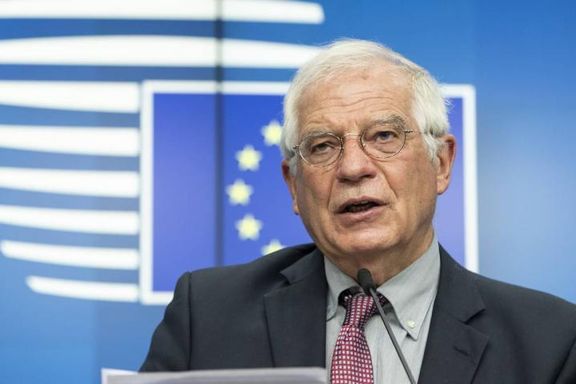
EU foreign policy chief Josep Borrell has expressed concerns about Armita Geravand, an Iranian teenage girl who fell into a coma after an encounter with hijab enforcers.

EU foreign policy chief Josep Borrell has expressed concerns about Armita Geravand, an Iranian teenage girl who fell into a coma after an encounter with hijab enforcers.
The High Representative of the European Union for Foreign Affairs and Security Policy told Iran International that they “are following this worrying case.”
“While all the details are not yet clear, the reports indicate that her condition is the result of a confrontation with the police,” Borrell said, adding, “If confirmed this would be unacceptable and unjustifiable.”
Touching upon the issue of the human rights situation in Iran, Borrell noted that “it is something that the EU not only follows closely and raises regularly with the Iranian authorities (most recently with the Foreign Minister of Iran)," but also reacts to with public condemnation and with sanctions against those responsible.
Despite growing concerns expressed by numerous activists and officials regarding her condition, Iranian authorities have escalated efforts to suppress information about her.
Security has remained high at the Fajr hospital where Armita is receiving intensive care since the beginning of the week.
According to information obtained by Iran International, physicians and nurses entering her room are subjected to continuous physical search to ensure they do not carry mobile phones or cameras. The surveillance cameras in her room have also been disconnected to prevent hacking or leakage of images.
Authorities are not forthcoming about the circumstances surrounding Armita's coma. Meanwhile, the media is filled with concerns from Iranians, foreign activists, and officials, all fearing a scenario similar to Mahsa Amini's death could reoccur.
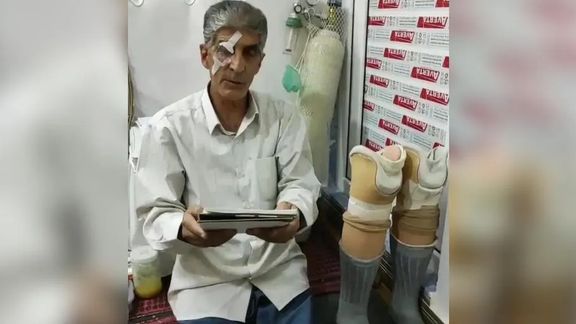
An Iranian war veteran of the Iran-Iraq war has been sentenced to a total of 13 years behind bars on several charges that include insulting the Supreme Leader.
Mohammad-Vali Heydarbeigi, who has lost both his legs, one ear, and his teeth during the eight-year war, was given the sentence by the criminal court of the city of Abhar in Zanjan province, the US-based Human Rights Activists News Agency (HRANA) reported Thursday.
His charges include five years for “collaborating with a hostile government;” one year for "propaganda against the Islamic Republic system;" two years for “insulting the Supreme Leader;” and another five years for “conspiracy and collusion against national security and membership in anti-revolutionary groups.”
Under the laws of the Islamic Republic, if this verdict is upheld by the court of appeal, he must serve the harshest punishment, which will be five years imprisonment in his case.
The war veteran was arrested on November 19, 2022, and was transferred to the Intelligence Detention Center of the Revolutionary Guards (IRGC) in Zanjan. He was released on bail several weeks later. It is not clear if he was arrested during street protests that rocked Iran last year after the death in custody of 22-year-old Mahsa Amini.

France has denounced Iran's launch of the Nour-III satellite, declaring it a violation of UN Security Council Resolution 2231, which endorsed the nuclear deal.
In a statement released on Thursday, the French Ministry for Europe and Foreign Affairs expressed concerns, stating, "Due to the significant technological overlap between space launches and ballistic missile launches, this event directly contributes to Iran's worrisome progress in its ballistic missile program."
Iran announced the successful launch of the satellite, utilizing the Qased Space Launch Vehicle, on September 27th. This launch incorporated technology crucial for the development of a long-range ballistic missile system, coming at a time of escalating tensions between Iran and Western nations.
Paris asserts that this launch follows a series of breaches and repeated violations of Resolution 2231, against the backdrop of nuclear escalation over several years, as reported by the International Atomic Energy Agency. The statement also emphasized "the international community's continued concern regarding Iran's ballistic program."
France called upon Iran to cease its destabilizing ballistic activities and reiterated its commitment to collaborating with allies to prevent Iran from acquiring nuclear weapons.
Last week, the UK also criticized Iran for the satellite launch, stating, "Iran has taken this action despite repeated calls from the UN Security Council to halt its ballistic missile program. Iran's actions further demonstrate its disregard for international restrictions and underscore the grave threat posed by the regime to global security."
This controversy is not new, as the United States has accused Iran of repeatedly violating UN Security Council regulations through its satellite program.
Iran has a history of promptly announcing successful space launches through its state-run television channels while often remaining silent on failed attempts. Over the past decade, Iran has launched several short-lived satellites into orbit and even sent a monkey into space in 2013. However, there have been five consecutive unsuccessful launches in the Simorgh program, which involves satellite-carrying rockets.
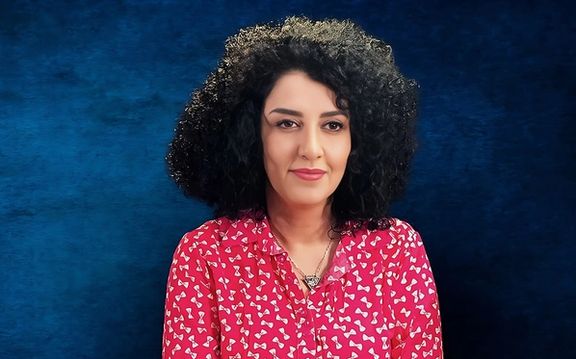
Narges Mohammadi, an Iranian women's rights advocate serving 12 years in jail, won the 2023 Nobel Peace Prize on Friday.
The award-making committee urged Iran to release Mohammadi, one of the nation's leading activists who has campaigned for both women's rights and the abolition of the death penalty.
Hailing Mohammadi as a "freedom fighter", the head of the Norwegian Nobel Committee started her speech by saying, in Farsi, the words for "woman, life, freedom" -- the main slogan of the current wave of protests against the Iranian government.
"The Norwegian Nobel Committee has decided to award the 2023 Nobel Peace Prize to Narges Mohammadi for her fight against the oppression of women in Iran and her fight to promote human rights and freedom for all," Berit Reiss-Andersen said in the citation.
The award also recognised the hundreds of thousands of people who have demonstrated against Iranian discrimination and oppression of women, Reiss-Andersen said. "Only by embracing equal rights for all can the world achieve the fraternity between nations that (prize founder) Alfred Nobel sought to promote," she said.
"This prize is first and foremost a recognition of the very important work of a whole movement in Iran, with its undisputed leader, Narges Mohammadi," Reiss-Andersen noted. "If the Iranian authorities make the right decision, they will release her so that she can be present to receive this honour (in December), which is what we primarily hope for."
The Office of the United Nations High Commissioner for Human Rights (OHCHR) said on Friday the award of the Nobel Peace Prize to Mohammadi highlighted the courage and determination of Iranian women.
"We've seen their courage and determination in the face of reprisals, intimidation, violence and detention," OHCHR spokesperson Elizabeth Throssell told reporters in Geneva.
"They've been harassed for what they do or don't wear. There are increasingly stringent legal, social and economic measures against them. This really is something that highlights the courage and determination of the women of Iran and how they are an inspiration to the world," Throssell added. "We and other partners of the UN human rights system have repeatedly called for her release."
Mohammadi was arrested on November 16, 2021, and one year after being released, was detained again. Currently, she is serving a total sentence of 9 years and 8 months, along with 154 lashes and additional penalties in Evin Prison. Charges include spreading propaganda against the state.
She has also been denied access to medical care amid deteriorating health. Mohammadi has been imprisoned several times over the past two decades for her work fighting for human rights.
She is the deputy head of the Defenders of Human Rights Center, a non-governmental organisation led by Shirin Ebadi, the 2003 Nobel Peace Prize laureate.
Mohammadi is the 19th woman to win the 122-year-old prize and the first one since Maria Ressa of the Philippines won the award in 2021 jointly with Russia's Dmitry Muratov.
In her letter to the UN Human Rights Council in Geneva in March, she said she is ready to testify against the authorities of the Islamic Republic regarding the torture, harassment and abuse of prisoners.
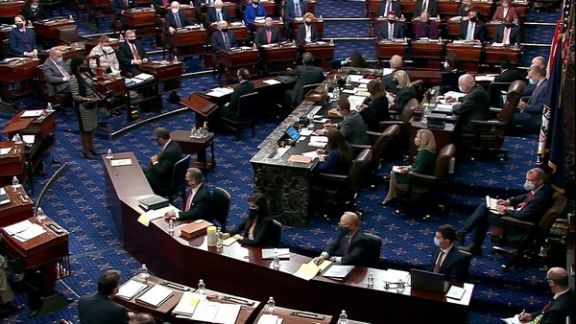
Senate Republicans have introduced a legislative measure that would make it extremely difficult for the Biden administration to lift economic sanctions imposed on Iran.
The new legislative effort, called the PUNISH Act, comes in the wake of the controversial ‘prisoner swap’ deal in August for which the administration released $6 billion of Iran’s frozen oil revenues blocked in South Korea and another $2.7 billion from Iraq.
The PUNISH Act takes away the President’s executive authority to lift economic penalties until the administration can show that the Islamic Republic and its affiliated groups in the region have ceased all attempts to assassinate American officials, citizens, and Iranian nationals in the United States.
“President Biden’s strategy of appeasement continues to risk the lives of Americans at home and abroad,” said Sen. Joni Ernst, introducing the Act, “Iran cannot be allowed to continue to attempt to kill US citizens and Iranian dissidents with impunity."

The Biden administration seems to be desperate to find a nuclear deal with Iran and is therefore willing to look away when the regime kills Iranian protesters or sells oil that is supposed to be sanctioned, some critics say.
“My PUNISH Act will put an end to this failed appeasement strategy and ensure Iran feels the maximum consequences of their actions from the United States,” Sen. Ernst said Thursday.
Critics in both Houses have warned the Biden administration that money made available to the regime in Iran would likely be used for more destabilization outside the country and more oppression inside.
Rep. Jim Banks –who introduced the MAHSA Act– highlighted this in a post on his account on X (Twitter), one day after news broke that yet another young girl had been beaten for not covering her hair and was now in critical condition.
“This sort of brutality will continue until Congress holds the Iranian regime accountable,” wrote congressman Banks, “The Senate must take up and pass my MAHSA Act now!
Iranian activists on social media were more direct and more pronounced in their criticism. Dozens bombarded the account of the Office of the Special Envoy for Iran, after it expressed concern and shock at the report.
“What exactly shocked you?!,” wrote one, “the way they’ve used your 6 billion to kill us? You stood by the Islamic Republic in all these crimes.”
https://twitter.com/justchangingun/status/1709706197295653093
The “$6 billion” has become a central part of most criticisms leveled at the Biden administration since its ‘prisoner swap’ deal.
The PUNISH Act seems to be a reaction to that deal. It has to be understood in the context of a broader pushback against Biden’s Iran policy. The administration negotiating with Iran since April 2021 with the declared aim or reviving the 2015 JCPOA nuclear agreement, while relaxing the enforcement of US sanctions. The result has been a surge in Iranian oil exports and a dangerous escalation of it nuclear program.
UN's nuclear watchdog, the International Atomic Energy Agency, estimates that Iran has enough enriched uranium to produce five nuclear bombs, a capability it did not have before Joe Biden was elected President.
Section 8 of the Act reads: “the President may not waive, suspend, reduce, provide relief from, or otherwise limit the application of sanctions imposed pursuant to any covered provision of law.”
The legislation states clearly that sanctions may only be lifted if the State Department certifies that Iran has refrained from supporting or attempting assassination or kidnappings for five continuous years. Lawmakers are also demanding classified briefings on Iran's ongoing assassination plots against US officials and citizens, emphasizing the need to ensure their safety and hold Iran accountable.
Given the Islamic Republic’s persistent pursuit of such actions and ongoing threats against American citizens and dissidents abroad, it is unlikely that the Biden administration can provide such a certification of compliance, assuming that the legislation is enacted into law.
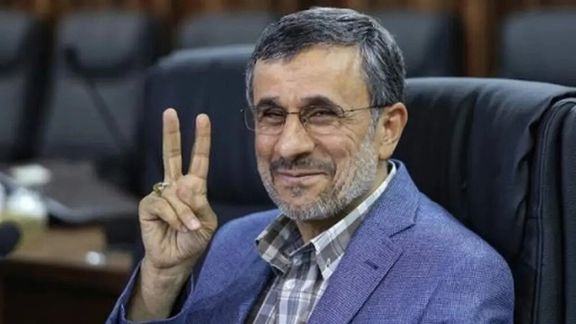
Iranian security and intelligence agencies have lifted the travel ban on Iran's former President Mahmoud Ahmadinejad's visit to Guatemala, as reported by media in Tehran on Friday.
Security authorities at Imam Khomeini Airport in Tehran thwarted Ahmadinejad's trip to Guatemala, seizing his passport and giving him a travel ban.
Stopped by IRGC intelligence officers, Ahmadinejad was traveling to a scientific and research symposium on water resource management, as a guest of the government and the University of Guatemala.
Ahmadinejad is a populist politician who was highly controversial during his presidency with his extremist views on Israel and refusal to cooperate with the international community to resolve disputes over Iran’s nuclear program. However, since 2017, he has turned into a critic of some policies pursued by the Islamic Republic. At times, he has even criticized Iran’s ruler Ali Khamenei.
Late Thursday, the semi-official ISNA website reported that the travel ban was lifted after Ahmadinejad accepted “security and political” responsibility for the trip. This could be referring to possible pledges made by the former president to the Revolutionary Guard’s intelligence organization regarding his conduct during the trip.
Saberin News channel also reported on Thursday evening, citing "informed sources," that "after his commitment to accepting political and security considerations and the possible consequences of this trip for him, relevant authorities have agreed to it."
Media close to the government had claimed that instability in Guatemala, the lack of an Iranian embassy and “strong Israeli influence” in the country were reasons behind the initial travel ban.